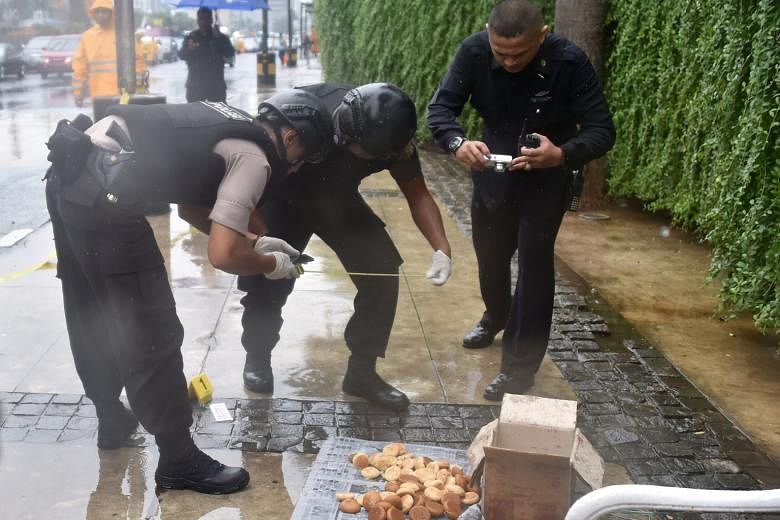The four militants who mounted the Jan 14 attack in downtown Jakarta were small-town boys who mostly grew up in rural Indonesia, far away from the capital.
Some of the villages in West Java province that The Straits Times visited while tracing the roots of one of the "Jakarta Four" attackers, Sunakim alias Afif, are accessible only by mud trails, and few of the homes have piped water.
Poverty is common in these countryside areas and social mobility remains limited for the people in places like Desa Duren, a three-hour drive from Jakarta.
During ST's visit, children ran freely along the dirt footpaths while their minders, all women, chatted outside their homes. Some men passed the time playing gaplek, a card game popular among villagers.
Sunakim was one of those men when he was renting a room in the village about two hours away from Desa Kalensari, his hometown.
From 2001, he worked at a tyre manufacturing plant in Karawang, about an hour's drive from Desa Duren, said village official Tanuwijaya.

"He was very sociable, often greeting people who pass by as he was playing gaplek," he added. "But that changed after he started mixing with a group of jenggots who came into town."
Jenggot means beard in Bahasa Indonesia, and villagers often associate people who grow the long goatees with extremist beliefs. These outsiders often arrive in places like Desa Duren on the pretext of visiting the village mosque or mussolah.
Their real mission, however, is to take over the teachings of the local imams and influence young men, stricken by poverty and the lack of job opportunities, with their own extremist ideology that is often skewed towards violence, according to Desa Duren village head Abdul Halim.
As Sunakim and his gang - who all hail from similar villages across Indonesia - have shown, some of these young men end up bearing arms for the terrorist cause.
Both Mr Halim and Mr Tanuwijaya believe Sunakim was first radicalised by one of those outsiders. They referred to the leader by the initials K.M. and said he led a group of eight, including Sunakim, who gathered at an empty mussolah then.
The Straits Times has since established his identity as Kirmanto, but little else is known about him. Mr Halim said the police are still trying to track him down.
The influx of what villagers call "grup jenggot" seems common in other townships as well.
Desa Kalensari village head Jajat Suhija, who also oversees the 21 mosques and mussolahs in his area, told The Straits Times that his staff have been on the alert to fend off such groups, even in recent months.
A former police official who has dealt with such intrusions in Poso, Central Sulawesi, said residents are often afraid to act against the extremists once they settle in.
"They were taken by surprise because the militants come gradually, and the residents only realised their presence after their numbers grew [in number]," said the officer, who asked not to be named due to the nature of his work. He has recommended that all villages implement a reporting system so community leaders can be alerted to suspicious outsiders.
While it is hard to pinpoint exactly when Sunakim, Muhammad Ali, Dian Joni Kurniadi and Ahmad Muhazin started on their journey to extremism, the influence of these village outsiders cannot be discounted.
As the Jan 14 attack has shown, seeds of terror planted in faraway sleepy villages by these grup jenggot - whether affiliated to the Islamic State in Iraq and Syria or local militant groups - can have a deadly impact years down the road.
So while the modest efforts in villages like Desa Duren and Desa Kalensari to stem the spread of extremism are laudable, more can and must be done.
But even as the Indonesian authorities focus on strengthening anti-terrorism laws, tightening borders and curtailing the influence of terror inmates in the wake of the Jan 14 strike, many security experts are urging the government not to ignore the grassroots.
Ms Sidney Jones of the Jakarta-based Institute for Policy Analysis of Conflict believes that the National Counter-Terrorism Agency "has not been effective in its prevention and deradicalisation work, in part because its programmes have been too broad and not sufficiently grounded in detailed knowledge of how and where radicalisation takes place".
She added that "lessons learned from working with relatively small population could be applied to broader prevention policies".
Mr Muhammad Saiful Alam Shah Sudiman, an associate research fellow at the S. Rajaratnam School of International Studies, agrees.
"Instead of giving the spotlight to terrorist attacks, which only strengthens their appeal, more coverage should now be given to initiatives to build community resilience," he said.
"This is how society will eventually become the decisive force that will defeat terrorism."

